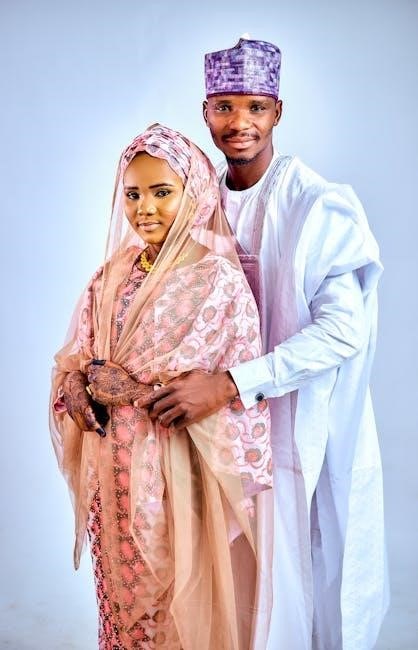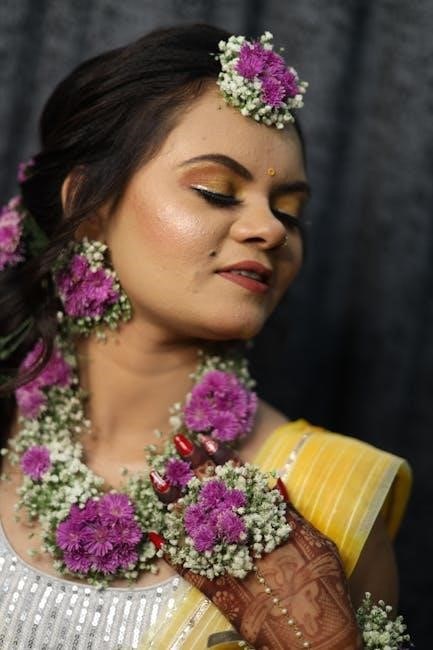A Connecticut Marriage License is essential for legally recognizing a marriage. It ensures all requirements are met. The application is available as a PDF, simplifying the process.
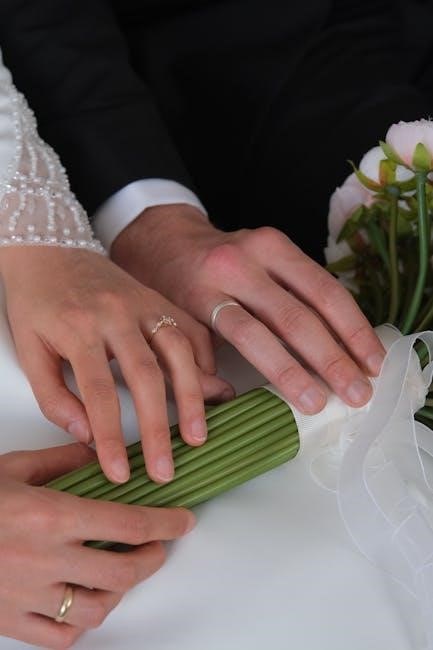
Eligibility Criteria for Marriage in Connecticut
Eligibility for marriage in Connecticut requires both parties to meet legal age, provide consent, and not be prohibited by blood relation or other legal restrictions.
2.1. Age Requirements
In Connecticut, individuals must be at least 18 years old to marry without parental consent. Minors aged 16 or 17 can marry with written parental or guardian consent; Those under 16 require court approval through a judicial hearing. Both parties must provide proof of age, such as a birth certificate or valid government-issued ID. The state enforces these age requirements to ensure legal capacity for marriage. Compliance with these rules is mandatory for obtaining a marriage license. Proper documentation is essential to avoid delays in the application process.
2.2. Residency Requirements
Connecticut does not require applicants to be state residents to obtain a marriage license. Non-residents can apply for a license in any town or city in Connecticut. The license is valid for ceremonies performed within the state. Both parties must appear in person at the town clerk’s office where they wish to apply, regardless of residency. While residency is not a requirement, applicants must provide proper documentation to confirm their identity and age. This flexibility makes Connecticut a convenient location for out-of-state couples planning to marry. The application process is straightforward, with no additional residency-based hurdles.
2.3. Mental Capacity and Consent
Mental capacity and consent are critical for a valid marriage in Connecticut. Both parties must be of sound mind to understand the nature of the marriage commitment. This means they must be capable of providing informed consent without coercion or undue influence. Connecticut law does not require a psychiatric evaluation unless there are significant concerns about a person’s mental capacity. If either party is under guardianship due to mental incapacity, the court may need to approve the marriage. Ensuring mental capacity protects the validity of the marriage and upholds the rights of both individuals involved in the union.
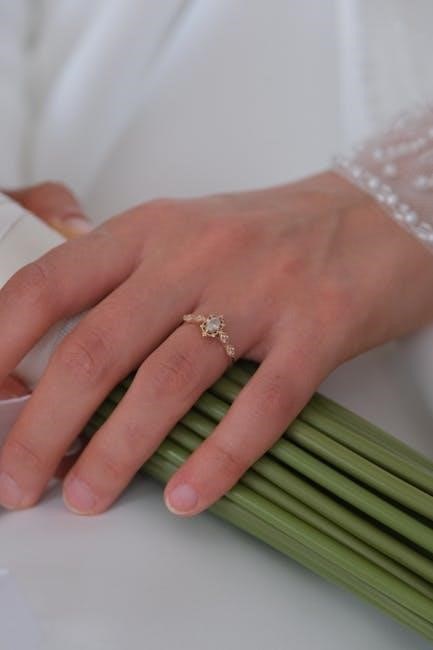
Required Documents for Marriage License Application
To apply for a Connecticut marriage license, you must provide identification, proof of age, and any necessary documents related to previous marriages or widowhood, such as divorce decrees or death certificates;
3.1. Identification Documents
Applicants must provide valid government-issued identification, such as a driver’s license, state ID, or passport. Both parties must present original or certified copies of their IDs. Acceptable documents include but are not limited to U.S. passports, birth certificates, or military IDs. The identification must clearly show the applicant’s name, date of birth, and photo. If applicable, non-citizens may need to provide additional documentation, such as a valid visa or green card. Ensure all documents are up-to-date, as expired IDs may not be accepted. Proper identification is crucial for verifying eligibility and processing the marriage license application efficiently.
3.2. Proof of Age
Applicants must provide documentation to verify their age. Accepted documents include a certified birth certificate, passport, or baptismal record. The birth certificate must be an original or certified copy. If a birth certificate is unavailable, alternative documents like a delayed birth certificate or court-issued age verification may be accepted. Both parties must provide proof of age, as Connecticut requires all applicants to meet the minimum age requirement for marriage. Ensure the documents are legible and issued by a recognized authority. This step is critical for confirming eligibility and proceeding with the marriage license application. Proper age verification prevents delays in the process.
3.3. Divorce or Widowhood Documents
If either applicant has been previously married, proof of the end of the last marriage is required. This can be a certified divorce decree or death certificate. The document must be an original or certified copy, issued by the relevant authority. If the divorce was finalized outside the U.S., it may need to be authenticated or translated. Widows or widowers must provide the deceased spouse’s death certificate. These documents ensure the applicant is legally free to marry. Submitting the correct paperwork prevents delays in the application process. Ensure all documents are valid and clearly legible to avoid complications. Proper documentation is essential for a smooth marriage license application.
The Marriage License Application Process
The Connecticut marriage license application process is straightforward, offering both online and in-person options. It ensures a streamlined and efficient experience, while adhering to legal requirements.
4.1. Online Application Option
The online application option for a Connecticut marriage license offers convenience and efficiency. Couples can initiate the process by visiting the official Connecticut government website and completing the marriage license application form. Both partners must provide detailed personal information, including names, dates of birth, and residency details. The system securely processes the data, and once submitted, the application is reviewed. While the application is online, the marriage license must still be picked up in person, as required by Connecticut law. This method streamlines the process, reducing the need for lengthy in-person visits and allowing couples to prepare their documents in advance. A printed confirmation page is typically required when picking up the license, ensuring a smooth experience.
4.2. In-Person Application
To apply for a Connecticut marriage license in person, visit the local town clerk’s office where the wedding will take place. Both parties must appear together, providing valid identification, proof of age, and any required documents such as divorce decrees or death certificates. The application process typically involves completing a form and paying the applicable fee, which may vary by town. Cash is often required, though some offices accept credit or debit cards. Once the application is submitted and processed, the marriage license is issued immediately, allowing the ceremony to be scheduled. This method is ideal for those who prefer face-to-face assistance or need same-day processing.
Fees Associated with Marriage License

The fee for a Connecticut marriage license is typically $30, though this may vary slightly depending on the town. Cash is usually required, as not all offices accept credit or debit cards. This fee covers the issuance of the license and is non-refundable, even if the marriage is postponed or canceled. Additional costs may apply for certified copies of the marriage certificate after the ceremony. It’s advisable to confirm the exact fee with the local town clerk’s office before applying, as prices may differ between jurisdictions. This payment is a necessary step to obtain the legal documentation needed to proceed with the marriage.
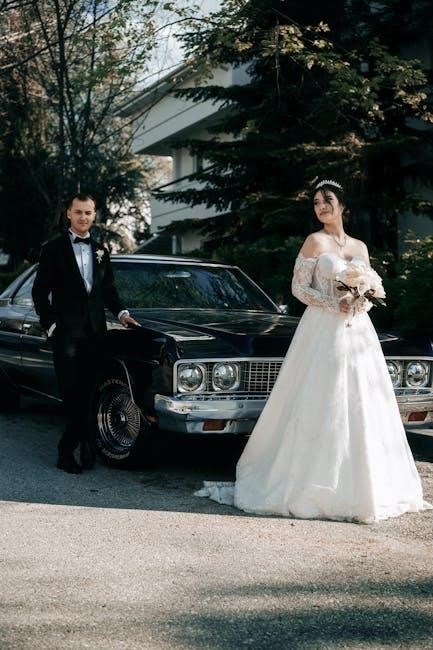
Processing Time and Wait Period
In Connecticut, the marriage license is typically issued immediately after the application is submitted and approved. There is no mandatory waiting period, allowing couples to marry as soon as the license is obtained. However, processing times may vary slightly depending on the town clerk’s office workload. It’s recommended to submit the application well in advance to avoid delays. Once issued, the license is valid for 65 days; Couples should ensure all steps are completed promptly to meet any ceremony scheduling requirements. No additional wait period is required after obtaining the license, making the process straightforward for couples ready to proceed.

Obtaining the Marriage License PDF
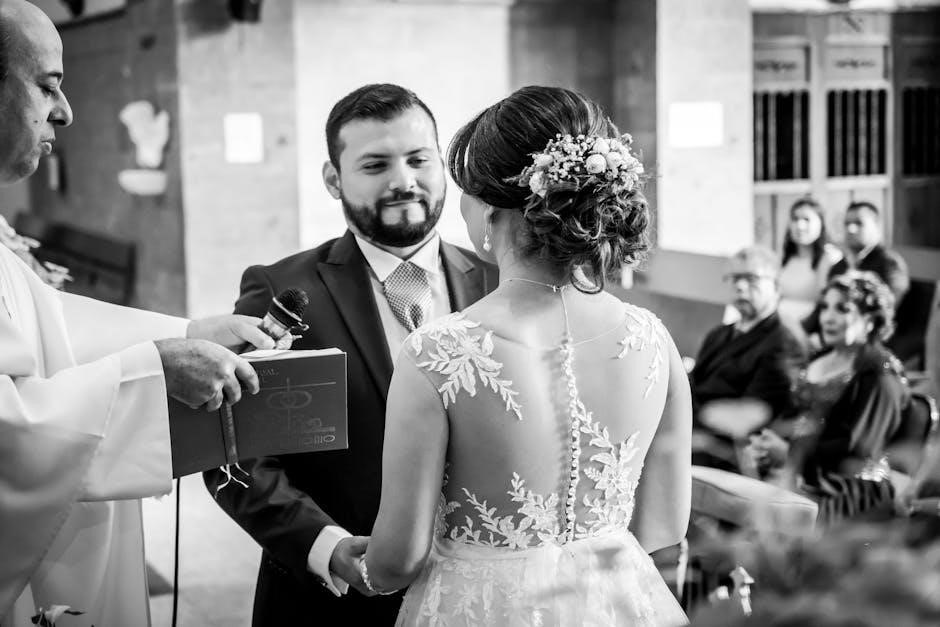
The Connecticut marriage license application is readily available as a PDF document on the official Connecticut government website or through local town clerk offices. Couples can download the form, fill it out online, and print it for submission. The PDF format ensures compatibility and ease of use. Once completed, the form must be signed by both applicants and notarized if required. While the PDF simplifies the process, applicants still need to visit the town clerk’s office in person to finalize the application. It’s advisable to verify the website for the most up-to-date version of the PDF to ensure compliance with current regulations and requirements.
Completing and Submitting the Application
Completing the Connecticut marriage license application PDF requires careful attention to detail. Ensure all fields are filled accurately, including personal information, residency details, and previous marriage history. Both applicants must sign the form in the presence of a notary public or town clerk. Once completed, the application can be submitted in person at the local town clerk’s office or mailed, depending on the town’s policies. Applicants must review the form for errors before submission, as incomplete or incorrect applications may delay processing. It is also advisable to retain a copy for personal records. Submission marks the final step before the license is issued, typically on the same day.
Post-License Application Steps
After obtaining the license, schedule the ceremony with an authorized officiant. Ensure the officiant signs and returns the license within 65 days. Keep a copy for records.
9.1. Scheduling the Ceremony
Scheduling the ceremony involves coordinating with an authorized officiant and selecting a date and location. Ensure the officiant is licensed in Connecticut and familiar with local regulations. Choose a venue that suits your preferences, whether indoor or outdoor. Confirm the date, time, and location in writing to avoid misunderstandings. Consider having a backup plan for outdoor ceremonies in case of unfavorable weather. Notify guests and ensure all parties are aware of the details. Remember, the marriage license is valid for 65 days, so plan accordingly. Proper scheduling ensures a smooth and stress-free ceremony experience.
9.2. Officiant Requirements
In Connecticut, the officiant must be authorized to perform marriages. This includes judges, magistrates, ordained clergy, and justices of the peace. Officiants must be at least 18 years old and legally authorized. Couples can also choose to be officiated by a friend or family member if they obtain proper certification, such as online ordination. The officiant must complete the marriage license, ensuring all details are accurate, and return it to the town clerk within 10 days post-ceremony. They must also witness the ceremony and confirm the couple’s consent to marry. Proper officiant credentials are crucial for the marriage to be legally recognized in Connecticut.
Validity of the Marriage License
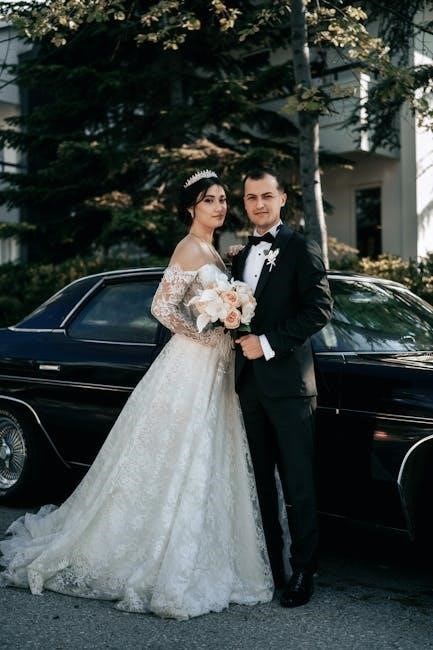
A Connecticut Marriage License is valid for 65 days from the date of issuance. Couples must marry within this timeframe to ensure the license remains effective. If the ceremony does not occur within 65 days, a new application and fee are required. The license is only valid for marriages performed within Connecticut. Once the ceremony is conducted, the officiant must complete and return the license to the town clerk within 10 days. There is no waiting period in Connecticut, so couples can marry as soon as the license is issued. Properly completing the license ensures its validity and legal recognition of the marriage.
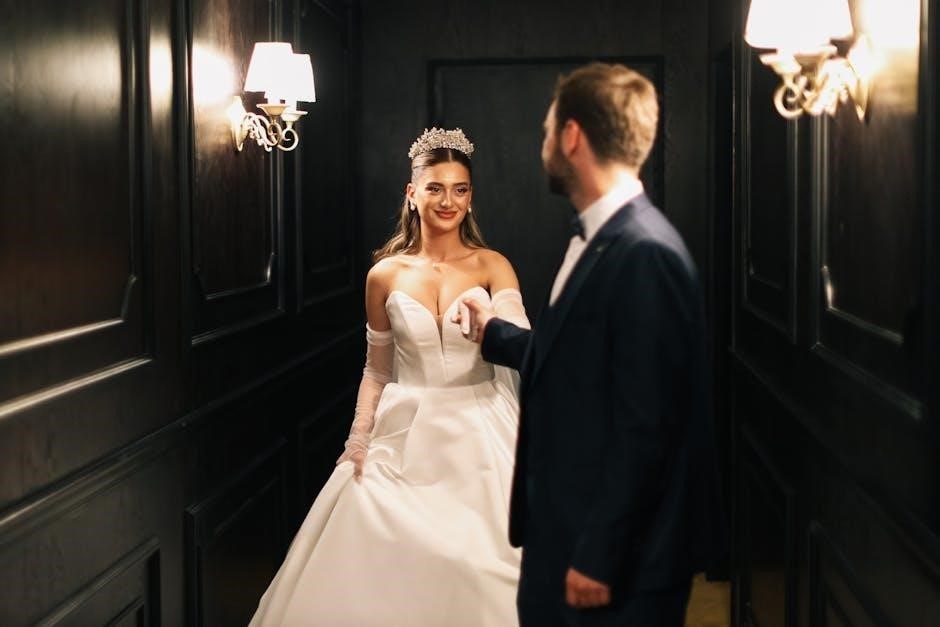
Filing the Completed License
After the ceremony, the completed marriage license must be filed with the town clerk’s office within 10 days. The officiant is responsible for completing and signing the license, ensuring all details are accurate. Once filed, the license becomes a public record. The couple can then request a certified marriage certificate, which serves as legal proof of marriage. Timely filing ensures the marriage is officially recognized. Any delays may require additional steps. The town clerk will process the document and update records accordingly. Proper filing is crucial for administrative and legal purposes, ensuring the marriage is fully documented and acknowledged by the state.
Obtaining a Marriage Certificate
A marriage certificate is legal proof of marriage, required for name changes, benefits, and official transactions. Couples can request a certified copy from the town clerk’s office. The process typically involves submitting a request form, either online or in person, and paying a fee. The certificate includes details from the marriage license and is issued after the completed license is filed. It is essential to obtain the certificate promptly for administrative purposes. Both spouses can request copies, which are often needed for legal, financial, or immigration matters. The certificate serves as an official record of the marriage and is widely accepted as valid identification.
Obtaining a Connecticut marriage license involves a structured process to ensure legal validity. By following the outlined steps and submitting the required documents, couples can efficiently navigate the application process. Additional resources are available to assist, such as the Connecticut Department of Public Health website, local town clerk offices, and legal aid services. These resources provide guidance on specific requirements and potential complications. For further assistance, couples can also consult marriage planning guides or seek advice from legal professionals. Ensuring all steps are completed accurately guarantees a smooth and lawful marriage process in Connecticut.
- Connecticut Department of Public Health: www.ct.gov/dph
- Local Town Clerk Offices: Contact information available on municipal websites.
- Legal Aid Services: Offer free or low-cost legal advice for marriage-related matters.
